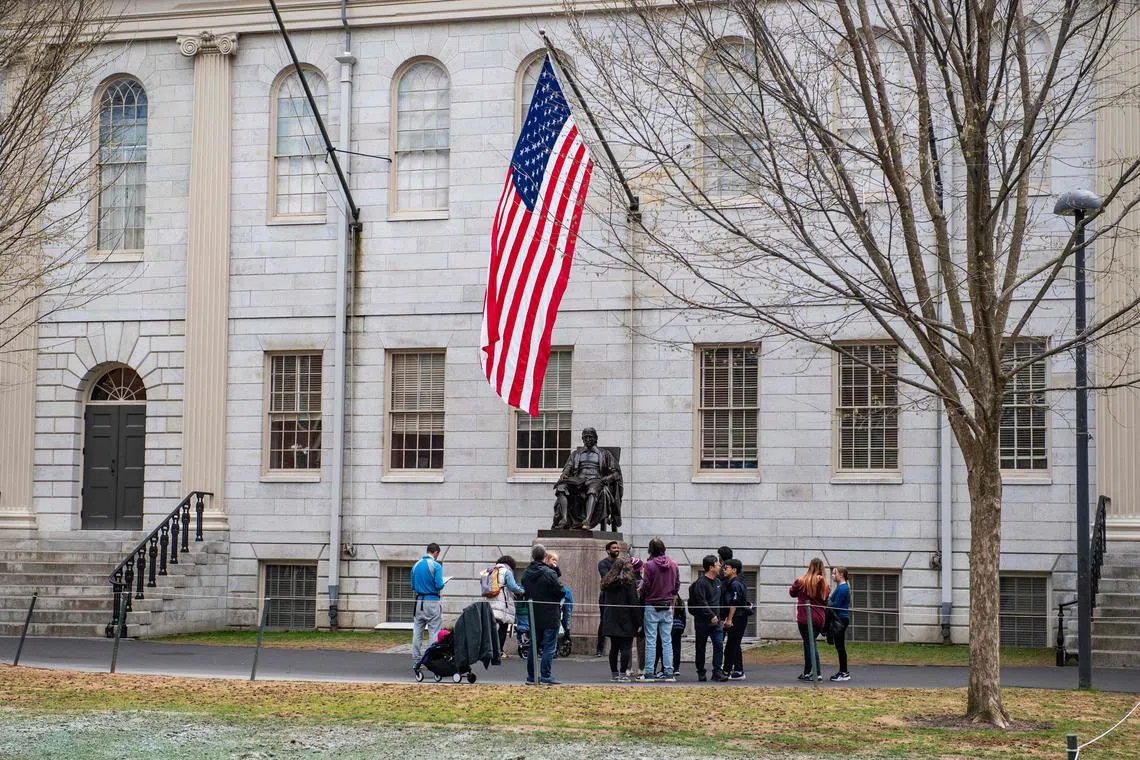After Harvard rejects US demands, Trump demands apology and adds a new threat
Sign up now: Get ST's newsletters delivered to your inbox

US President Donald Trump may strip Harvard of its tax-exempt status.
PHOTO: AFP
Follow topic:
NEW YORK - US President Donald Trump threatened to strip Harvard
Beginning with Columbia University, pro-Palestinian student protest movement that roiled campuses in 2024
Mr Trump has called the protests anti-American and anti-Semitic, accused universities of peddling Marxism and “radical left” ideology, and promised to end federal grants and contracts to universities that do not agree to his administration’s demands.
He said in a social media post on April 15 that he was mulling over whether to seek to end Harvard’s tax-exempt status if it continued pushing what he called “political, ideological, and terrorist inspired/supporting ‘Sickness?’”
He did not say how he would do this. Under the US tax code, most universities are exempt from federal income tax because they are deemed to be “operated exclusively” for public educational purposes.
White House press secretary Karoline Leavitt told reporters Mr Trump wanted to see Harvard apologise for what she called “anti-Semitism that took place on its college campus against Jewish American students”.
She accused Harvard and other schools of violating Title VI of the Civil Rights Act, which prohibits discrimination by recipients of federal funding based on race or national origin.
Under Title VI, federal funds can be terminated only after a lengthy investigation and hearings process and a 30-day notification to Congress, which has not happened at Columbia or Harvard.
Some professors and students have said the protests are being unfairly conflated with anti-Semitism as a pretext for an unconstitutional attack on academic freedoms.
Columbia, a private school in New York City, agreed to negotiations over demands to tighten its protest rules
Harvard president Alan Garber, in an April 14 letter, said demands the Trump administration made of the Massachusetts university, including an audit to ensure the “viewpoint diversity” of its students and faculty and an end to diversity, equity and inclusion programmes, were unprecedented “assertions of power, unmoored from the law” that violated constitutional free speech and the Civil Rights Act.
Like Columbia, he said Harvard had worked to fight anti-Semitism and other prejudice on its campus while preserving academic freedoms and the right to protest.
Hours after Professor Garber’s letter, the Trump administration’s Joint Task Force to Combat Anti-Semitism said it was freezing more than US$2 billion in contracts and grants to Harvard, America’s oldest and richest university. The administration did not respond to questions about which grants and contracts had been cut, and Harvard did not respond to a request for comment.
Some Columbia professors have sued the Trump administration, saying the grant terminations violated Title VI and their constitutional speech and due process rights. A federal judge in New York ordered the Trump administration to reply by May 1.
After reading the Harvard president’s letter, Columbia’s interim president Claire Shipman said in a statement on April 14 that Columbia will continue with what it viewed as “good faith discussions” and “constructive dialogue”
“We would reject any agreement in which the government dictates what we teach, research, or who we hire,” she wrote.
On April 14, a group of US universities, including Princeton
Mr Trump, who took office on Jan 20, faces court challenges to his immigration policies and pushback from state attorneys-general trying to block his firing of government workers and suspension of trillions of dollars in federal grants, loans and financial support. REUTERS

